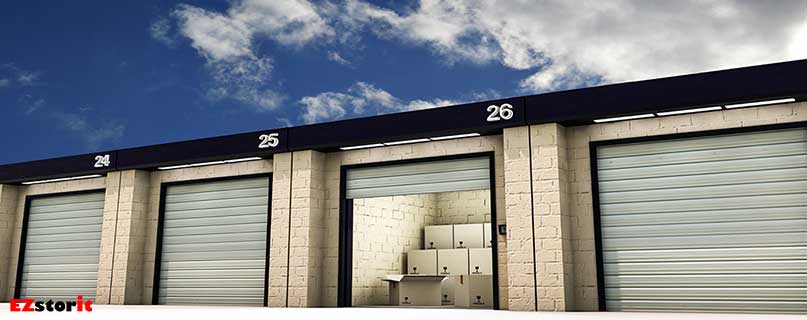Feb
19
Smart Storage Solutions: How IoT is Transforming the Self-Storage Industry
19

The Internet of Things (IoT) is revolutionizing industries with its capability to connect devices for improved operations. Urbanization, downsizing, and space management needs have spiked demand for self-storage facilities among businesses and individuals alike. IoT technologies are at the forefront of enhancing self-storage, offering unprecedented efficiency, security, and customer experience.
As of 2022, the self-storage industry is valued at approximately $37 billion worldwide. By integrating smart systems, facilities now provide real-time monitoring, automated access, and personalized services, transforming how we store and manage possessions, setting a new standard in convenience and reliability.
Evolution of the Self-Storage Industry
Traditional Self-Storage Practices
Traditional self-storage facilities often rely on manual processes, including key-based locks, paper contracts, and onsite management. These methods come with limitations: restricted access hours, the potential for human error, and a lack of real-time security monitoring. A recent report highlights that its simplicity also makes them potentially vulnerable to determined thieves equipped with tools like bolt cutters or lock-picking sets.
Transition to Smart Storage Solutions
The transition to smart storage solutions has been revolutionary, with the introduction of electronic systems, digital locks, and cloud-based management platforms, all enabled by the Internet of Things (IoT). Parks Associates' new white paper explores self-storage evolution and tech's role in revenue expansion. This digital transformation brings numerous benefits:
• Enhanced security with real-time monitoring and alerts.
• Improved customer service through 24/7 access and self-service options.
• Operational efficiencies, including automated billing and inventory management.
Key Components of IoT-Enabled Smart Storage
Digital Access and Security Systems
Imagine the convenience of never needing a physical key again. Smart locks, now installed in over 12 million US households, grant access via smartphones or RFID technology. They also boast remote monitoring features, connecting CCTV cameras to mobile apps for instant alerts on unauthorized access. With motion detectors, door sensors, and facial recognition, your belongings stay secure day and night.
Environmental Monitoring
Sensitive items like electronics or important documents require specific conditions to stay in prime condition. Thanks to IoT sensors, monitoring temperature, humidity, and air quality is now simpler and more effective. These sensors not only keep tabs on environmental conditions but also allow for remote adjustments. This means if the humidity levels rise unexpectedly, you can adjust settings from afar to ensure your rare book collection remains in mint condition.
Inventory and Space Management
For business users, keeping track of inventory can be a daunting task. IoT sensors step in to simplify this process, enabling efficient inventory management through real-time tracking. Moreover, smart shelving solutions revolutionize how we think about organizing our storage units. These systems analyze your items and suggest the best storage methods and arrangements for optimal space utilization. Picture a system that tells you exactly where to place your winter gear to maximize space and preserve the quality of your items.
Benefits of Smart Storage Solutions
Enhanced Security and Safety
The cornerstone of smart storage solutions is the unparalleled security and safety they offer. Real-time surveillance and automated security systems work tirelessly to reduce theft and enhance facility safety. These systems are equipped with:
• Immediate alerts for unusual activity, allowing for quick response.
• Remote access control to manage entry and exit securely.
• Automated recording for incident review and evidence.
• Environmental monitoring to prevent damage from fire, water, or pests.
Improved Customer Experience
Smart storage solutions offer exceptional convenience. Customers enjoy 24/7 access to their units via mobile applications, allowing them to manage their storage remotely. This flexibility is crucial for those late-night moments when you realize you need something from storage. Furthermore, the ability to personalize storage conditions for delicate items—like adjusting temperature or humidity through an app—ensures the preservation of sensitive belongings, from vintage wine collections to precious artwork.
Operational Efficiency and Cost Reduction
The automation of billing and contract management significantly reduces the administrative burden, minimizing errors and saving time. PricewaterhouseCoopers analysts propose that employing contract management can save a business up to 2% annually by preventing inaccuracies and non-compliance.
Smart environmental controls, such as energy-efficient lighting and HVAC systems, adjust based on real-time needs, leading to considerable cost savings. These systems ensure that energy is only used when necessary, cutting down on waste and reducing operational costs.
Challenges and Considerations
Privacy and Data Security Concerns
In an era where customer data privacy is paramount, the transition to smart storage solutions raises valid concerns. To address these worries, stringent steps are in place to secure data transmissions and storage, ensuring compliance with GDPR and local data protection laws. Here's a guide to safeguarding your data:
1. Encryption of Data: All data transmitted and stored is encrypted, making unauthorized access extremely difficult.
2. Regular Security Audits: Conducting frequent audits to identify and rectify potential vulnerabilities.
3. Compliance with Regulations: Adhering strictly to international and local data protection laws.
4. User Access Control: Implementing robust access controls to limit data access based on user roles.
Investment and Maintenance Costs
Adopting IoT in self-storage isn't without its financial implications. The initial setup requires a substantial investment in both hardware (like sensors and cameras) and software platforms. Moreover, ongoing maintenance, software updates, and technology upgrades are essential to keep the system secure and functional. A study by McKinsey highlights that proactive maintenance can reduce costs by up to 18% to 25% by preventing expensive downtimes.
Keeping up with Technology Advancements
Staying current with technological advancements is vital for the long-term success of smart storage solutions. By 2025, IDC forecasts 55.9B connected devices globally, with 75% linked to an IoT platform. Here are five strategies to remain ahead:
1. Invest in Scalable Solutions: Choose technology that can grow with your business needs.
2. Continuous Learning: Stay informed about the latest trends and innovations in IoT and storage solutions.
3. Partner with Tech Experts: Collaborate with technology providers who are leaders in the field.
4. Feedback Loops: Use customer feedback to guide technology updates and improvements.
5. Future-proofing Infrastructure: Design your IoT infrastructure with future advancements in mind, allowing for easy updates and integrations.
Future Trends in Smart Storage
Looking towards the horizon, the self-storage industry is poised for substantial growth, with a projected CAGR of 7.54% from 2022 to 2027, reaching $83.6 billion. Here's a glimpse into the future trends that are set to redefine storage solutions:
• Integration of AI for Predictive Analytics: AI will analyze usage patterns to optimize storage space and pricing strategies, making facilities more efficient and user-friendly.
• Blockchain for Enhanced Security: Expect blockchain technology to secure transactions and customer data, offering unparalleled protection against fraud and theft.
• Advancements in Automation: Automated systems for inventory management, climate control, and security will become more sophisticated, reducing the need for manual oversight.
• Smart City Integration: Smart storage solutions will likely play a role in broader smart city initiatives, such as optimizing urban space and supporting efficient resource use, contributing to more sustainable and livable cities.
Final Thoughts
As IoT weaves its transformative thread through the self-storage industry, it's clear that smart storage solutions are not just the future—they're the present. These technologies are redefining security, convenience, and efficiency, marking a pivotal shift in how facilities operate and engage with customers.
For self-storage operators, now is the time to embrace IoT solutions. By doing so, you're not just keeping up with technology; you're future-proofing your business. Let's look forward to a future where our storage spaces are not just places to keep things but smart, integrated parts of our digital lives.
By: Adriana Evans





